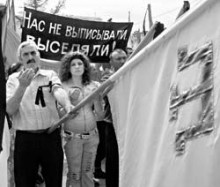SYMFEROPOL-The largest public rallies in the Crimea are usually held on Memorial Day for the Victims of the Deportation, which is observed every year on May 18. Last Friday was no exception. An estimated 10 to 15 thousand Crimean Tatars, who came to Symferopil from every region in the Crimea, marched in five columns to the government building on the central square. Delegations also arrived from Romania, Turkey, Germany, France, and Austria to take part in the commemorative events.
The resolution passed by the rally participants notes that the state’s wait-and-see policy towards the deportees has resulted in “the bitter resistance of the Crimean executive bodies and local administrations to any initiatives aimed at encouraging the Crimean Tatar people to exercise their rights, including such things as land distribution, education in their native language, and restoration of historical toponyms,” “a lack of positive dynamics in restoring deportees’ rights,” “a continuing integrity gap among the Crimean Tatar people,” and “the feverish activities of various chauvinistic organizations in the Crimea, openly calling for violence against the Crimean Tatars.”
The document points out that the Crimean Tatars, who “are struggling for their rights on the basis of respect for territorial integrity and the sovereignty of the Ukrainian state,” believe that in these conditions “the process of restoring the Crimean people’s rights will be further torpedoed unless international and European organizations intervene, and our patience will be subjected to never-ending trials.” The rally resolved that an all-out effort be made to have the plight of the Crimean Tatar people in Ukraine put on the agenda of specialized UN, Council of Europe, and European Union agencies.
The demonstrator called for the Majlis to demand that the president and the cabinet raise the question of assisting Ukraine to welcome and settle the deported people in the Crimea at the meeting of the CIS heads of governments to be held in Yalta on May 25-27.
“This should be done so that everyone in Ukraine will understand that the democratization of Ukrainian society is impossible unless the Crimean Tatar problem is solved,” MP Renat Chubarov commented in an interview. “There are plans to furnish approximately 70 million hryvnias from Ukraine’s budget this year, and we are grateful to the state for this, but experts estimate that it will take about 2 billion dollars to settle such a mass of people in a new place. So far, Ukraine has allocated about 300-350 million dollars, which is totally insufficient. To our regret, the Ukrainian crisis has also halted the process of the Crimean Tatars’ integration into Ukrainian society in both economic and political terms. Now the dissolved Verkhovna Rada of Ukraine cannot discuss the bill on restoring the rights of deportees, which the president vetoed twice, although we had a firm deal that it would be resubmitted to parliament.”
After the rally ended last Friday, the remains of Edige Kyrymal, veteran of the Crimean Tatar national movement, were reburied at Zyndzhyrly-medrese on the outskirts of Bakhchisarai. Kyrymal (Shynkevych) led a very complex life. A Lithuanian-born Tatar, he was the nephew of the Muslim Mufti of Lithuania. Shortly before World War One he and his family moved to the Crimea, where he studied at the Symferopil Teacher-Training Institute. Fearing the raging Soviet repressions, he moved to Azerbaijan and later to Iran.
In 1932 he settled in Istanbul but shortly afterwards went to live with his uncle in Vilnius, where he began studying political science. When the Second World War broke out, he returned to Turkey. In December 1941 he moved to Berlin, where he established a national mission composed of Crimean Tatar emigres. In November-December 1942 he visited German-occupied Crimea, where he joined the Symferopil Muslim Committee. It is alleged that in January 1943 the German authorities officially recognized him as chairman of the Crimean Tatar National Center. After the war Kyrymal lived in West Germany. In 1954-72 he worked at the Munich-based Institute for the Study of the USSR. He is the author of the book The National Struggle of the Crimean Turkics (1952; in German). He died and was buried in Germany in 1980.
Following the reburial of Kyrymal’s remains, the Russian media raised hell, alleging that he was a “fascist henchman” and “collaborator” and that his reburial in the Crimea is a slap in the face of Crimean society. Refat Chubarov, deputy chairman of the Majlis, said in this connection: “Reburying Edige Kyrymal is a step toward reconciling the dead and the living. Our contemporaries should think about how to avoid tragic situations, when people have to stand on the opposite sides of the barricades. Edige Kyrymal was never linked to the Nazi regime to the extent that some Crimean politicians are trying to claim he was. I would like to note that Germany carried out very strict vetting, and any person who in some way had collaborated with the Nazi regime could never have reached the level of public recognition that Kyrymal did in Germany.”
Remembrance rallies and prayers were held in practically every Tatar- populated city and village in the Crimea. According to the Majlis, more than 50,000 Crimean Tatars as well as people of other nationalities took part in them.







